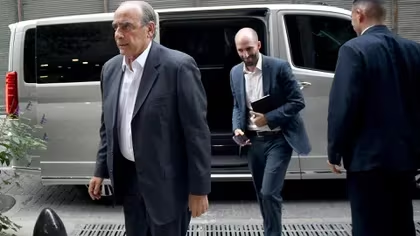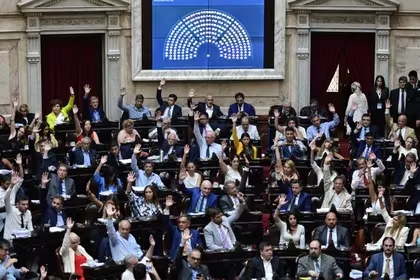Francos anticipated that Milei will veto a possible attempt by the governors to share the Country Tax - Infobae

Source:
February 05, 2024
The leaders are pressing to distribute the revenue and could take the issue to the debate, particularly of the omnibus law, which will begin tomorrow in the Deputies. The Casa Rosada reiterated this morning an inflexible position

Guillermo Francos, Minister of the Interior (Télam)
“If it's set that way, of course . The veto is a presidential power and the president has been clear that he does not participate in the Country Tax.” Thus, bluntly, the Minister of the Interior, Guillermo Francos , anticipated today that Javier Milei will veto a possible attempt by the governors to move forward with the inclusion of the distribution of the tax among the provinces during the debate in particular of the omnibus law in Deputies.
This tax is one of the central axes of the discussion between the Casa Rosada and the provinces in relation to the law that the Executive negotiates in Congress after the general half-sanction and in view of the debate that will take place in the Senate.
"The Government does not accept to participate in the Country Tax for several reasons: it is very transitory, it ends when the stocks end, and a burden cannot be generated on the national State on a tax that tends to disappear and that has to supplant the provinces with other taxes,” Francos said during the morning in dialogue with radio Rivadavía.

Deputies during the plenary session in which the debate on the "omnibus law" was resumed, promoted by the Government of Javier Milei (EFE) EFE
In this sense, the official added that “there were a series of misunderstandings” during the negotiation of the Executive with the Provinces. “The Government understands the situation, but we have to make a joint effort; When the fiscal package was withdrawn from the law, it was said that when it is approved we will sit down with the provinces to analyze how to proceed,” he insisted.
Created in 2020 by the Alberto Fernández administration in its first package of laws sent to Congress, the PAIS is a tax whose revenue is not shared with the provinces. It initially had a limited scope to the purchase of dollars or consumption in foreign currency and became part of the stable cast of the Argentine tax repertoire with an increasingly greater scope. So much so that in January - with almost $470,000 million - it was the fifth tax collected by the AFIP, behind VAT, Profits, Social Security and export duties (the latter also not co-shareable).
“This government is responsible, it will not do what was done in the YPF trial, it acts responsibly and thinks about the future of Argentines, we are not going to make irresponsible decisions,” said Francos.
The warning from the Minister of the Interior corresponds to the possibility that, encouraged by the governors, deputies from different opposition blocs manage to introduce the co-participation of this tax into the articles of the omnibus law.
“Never in 40 years since the return of democracy, has a National Government attacked and disrespected the Provinces as we have suffered since December 10. That the provisional president of the Senate insults us governors and treats us as 'animals' is not an attack on those of us who were elected by popular vote, it is an insult and a lack of respect for the millions of provincials who build the Republic,” Weretilneck replied in a post published on his social networks.
And he concluded: “They call us 'spending animals' because we guarantee the right to education and 'we spend' to give free security and health to our people; because we invest so that more tourists, Argentines and foreigners, do tourism and generate foreign exchange; because we build homes, schools and hospitals, we make routes and bring drinking water and sewage service to each home. Stop attacking and squeezing, stop the confrontation once and for all and seek consensus, and get out of your heads seeing us on our knees.”

Source:
February 05, 2024
The leaders are pressing to distribute the revenue and could take the issue to the debate, particularly of the omnibus law, which will begin tomorrow in the Deputies. The Casa Rosada reiterated this morning an inflexible position

Guillermo Francos, Minister of the Interior (Télam)
“If it's set that way, of course . The veto is a presidential power and the president has been clear that he does not participate in the Country Tax.” Thus, bluntly, the Minister of the Interior, Guillermo Francos , anticipated today that Javier Milei will veto a possible attempt by the governors to move forward with the inclusion of the distribution of the tax among the provinces during the debate in particular of the omnibus law in Deputies.
This tax is one of the central axes of the discussion between the Casa Rosada and the provinces in relation to the law that the Executive negotiates in Congress after the general half-sanction and in view of the debate that will take place in the Senate.
"The Government does not accept to participate in the Country Tax for several reasons: it is very transitory, it ends when the stocks end, and a burden cannot be generated on the national State on a tax that tends to disappear and that has to supplant the provinces with other taxes,” Francos said during the morning in dialogue with radio Rivadavía.

Deputies during the plenary session in which the debate on the "omnibus law" was resumed, promoted by the Government of Javier Milei (EFE) EFE
In this sense, the official added that “there were a series of misunderstandings” during the negotiation of the Executive with the Provinces. “The Government understands the situation, but we have to make a joint effort; When the fiscal package was withdrawn from the law, it was said that when it is approved we will sit down with the provinces to analyze how to proceed,” he insisted.
Created in 2020 by the Alberto Fernández administration in its first package of laws sent to Congress, the PAIS is a tax whose revenue is not shared with the provinces. It initially had a limited scope to the purchase of dollars or consumption in foreign currency and became part of the stable cast of the Argentine tax repertoire with an increasingly greater scope. So much so that in January - with almost $470,000 million - it was the fifth tax collected by the AFIP, behind VAT, Profits, Social Security and export duties (the latter also not co-shareable).
“This government is responsible, it will not do what was done in the YPF trial, it acts responsibly and thinks about the future of Argentines, we are not going to make irresponsible decisions,” said Francos.
The warning from the Minister of the Interior corresponds to the possibility that, encouraged by the governors, deputies from different opposition blocs manage to introduce the co-participation of this tax into the articles of the omnibus law.
“Get it out of your heads to see us on our knees”
In this context of tension, the Rio Negro Alberto Weretilneck defended the request of the provincial leaders and pointed out against the statements of the provisional president of the Senate, Bartolomé Abdala, who pointed out that the Country Tax is “regressive” and described the governors as “little animals of spend , that where they see that they can get something more to bring water to their mill they are going to do it.”“Never in 40 years since the return of democracy, has a National Government attacked and disrespected the Provinces as we have suffered since December 10. That the provisional president of the Senate insults us governors and treats us as 'animals' is not an attack on those of us who were elected by popular vote, it is an insult and a lack of respect for the millions of provincials who build the Republic,” Weretilneck replied in a post published on his social networks.
And he concluded: “They call us 'spending animals' because we guarantee the right to education and 'we spend' to give free security and health to our people; because we invest so that more tourists, Argentines and foreigners, do tourism and generate foreign exchange; because we build homes, schools and hospitals, we make routes and bring drinking water and sewage service to each home. Stop attacking and squeezing, stop the confrontation once and for all and seek consensus, and get out of your heads seeing us on our knees.”

